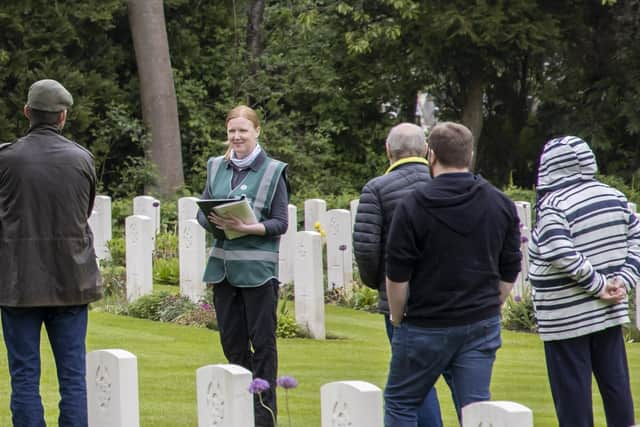'A civilian girl amongst flying men' - The Yorkshire woman working with bombsights in the Second World War
Dorothy, from Guisborough, was quite at home in a Bomber plane, a civilian girl working among flying men. After graduating with a physics degree from Leeds University in 1940, Dorothy took up work with the Ministry of Aircraft Production during the Second World War.
There she worked with bombsights – pieces of equipment used to calculate when bombs should be dropped from an aircraft. Combined with radar systems, the kit enabled accurate bombing at night and through cloud.
Advertisement
Hide AdAdvertisement
Hide AdAffectionately nicknamed ‘Bombsight Bertha’, Dorothy was one of only two women across the country, and the only one based in Northern Command, to visit airfields to inspect and gather data on bombsights and train bomb aimers.


Dorothy lost her life in a plane crash in 1943, just shy of her 24th birthday. She was thought to be testing the bombsight onboard a Halifax which took off from RAF Holme on Spalding Moor.
The plane crashed near Market Weighton flying at low level – and whilst some of the crew of six on board survived the initial crash, including Dorothy, they later succumbed to their injuries. Three of the team are buried at Stonefall Cemetery in Harrogate, but Dorothy, being a civilian, did not qualify for a war grave.
In common with more than 60,000 other civilians, Dorothy Robson is commemorated by the the Commonwealth War Graves Commission (CWGC) in its Civilian Roll of Honour at Westminster Abbey. Her story will also be featured as part of free CWGC guided tours of Stonefall Cemetery in March.
Advertisement
Hide AdAdvertisement
Hide AdDuring the Second World War, almost 1,000 service personnel were buried at Stonefall Cemetery. Guided tours for International Women’s Day will put a spotlight on the six female casualties commemorated, including local women who served in the Auxiliary Territorial Service and the Territorial Army Nursing Service.
One of the women, Sister Florrie Prest from Bilton, served at Dunkirk and in Africa and also on hospital ships in the Atlantic and Mediterranean.
During tours for Commonwealth Day, people will also be able to learn more about casualties from across the Commonwealth who are buried at Stonefall. These include two brothers who served as bomber pilots in the Royal Canadian Air Force and died just a few months apart.
As for Dorothy, crews learned a great deal from her, her officer colleague said after her death. “It was no easy job for a civilian girl to work among flying men. She used to say it embarrassed her to lecture the bomb-aimers. But she never showed it and her manner was conversational and easy.”
Stonefall Cemetery tours will take place from March 5 to 12. To book, visit cwgc.org/events
